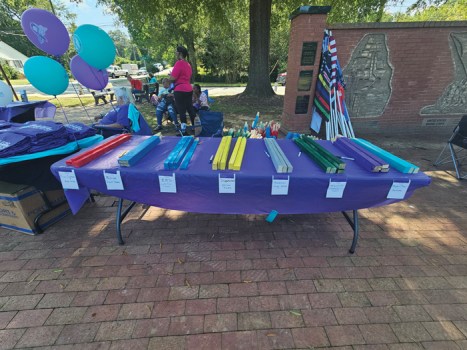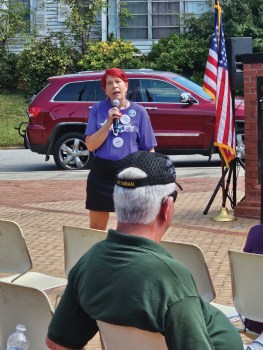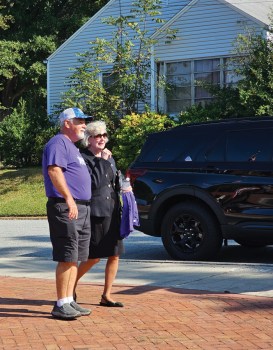Second annual Walk for Heroes remembers those gave all
Published 12:10 am Tuesday, September 24, 2024
1 of 4
Behind the Rowan County Sheriff's honor guard Salisbury Police Chief Patrick Smith, left, and Rowan County Sheriff Travis Allen lead the Walk for Heroes Saturday morning.
Photo by Elisabeth Strillacci
Stakes, with different colors representing different groups, were available for folks to write the names on of those they've lost - veterans, first responders, medical professionals - and the stakes were then planted in a temporary memorial garden at City Park during the Walk for Heroes on Saturday.
Photo by Elisabeth Strillacci
LCSW Patti Lyerly, who founded Walk for Heroes, said the therapy she practices for PTSD, called EMDR, is the "gold standard" of treatment and should be available to all who serve so they can be mentally and emotionally healthy.
Photo by Elisabeth Strillacci
Faith Mayor Randall Barger and Salisbury Mayor Karen Alexander start the Walk for Heroes on Saturday morning after Alexander read a proclamation for the month.
Photo by Elisabeth Strillacci
SALISBURY — The morning of Saturday, Sept. 21, was sunny, bright, almost hot outside the shade, an uplifting and cheerful day, unless you are remembering one of the thousands of veterans and first responders who commit suicide annually.
The second annual Walk for Heroes at City Park gave those who have lost someone a chance to celebrate that memory.
Although the numbers are unreliable, the Veterans Administration estimates that 22 veterans commit suicide each day. This means approximately 8,030 veterans kill themselves every year, more than 5,540 of whom are 50 or older. In addition, a study made up of information from the Centers for Disease Control and Prevention’s National Violent Death Reporting System (NVDRS) and occupational data from the National Institute for Occupational Safety and Health, it was determined first responders made up 1 percent of all suicides from 2015-2017. “When broken down by response discipline, these first responder suicides occurred among law enforcement officers (58 percent), firefighters (21 percent), EMS providers (18 percent) and public safety telecommunicators (2 percent),” according to the study.
The CDC noted in 2020 that “first responders may be at elevated risk for suicide because of the environments in which they work, their culture and stress, both occupational and personal.” In addition, “While telecommunicators are often the very first responders engaged with those on scene, research on their suicide risk and mental health has lagged.”
In response to the issue, Patty Lyerly, a licensed clinical social worker who has specialized in the treatment of PTSD for over 30 years, founded Walk for Heroes, an annual event focused not just on remembering veterans, first responders and medical professionals who have been lost to suicide, but on helping those suffering find healing and learning about the community resources available.
The walk Saturday morning was lead by the Rowan County Sheriff’s Office honor guard, Salisbury Mayor Karen Alexander and Faith Mayor Randall Barger along with Salisbury Police Chief Patrick Smith, Rowan County Sheriff Travis Allen, and Chief of Emergency Management Services for Rowan Bryan Edwards.
Captain Lonnie Ellis, a paramedic with Rowan County Emergency Services who also holds several specialized credentials including Tactical Emergency Medical Specialist, shared his own journey and reason for participating.
“It was a collection of things over the years, but when my grandfather was murdered, it was kind of the tipping point,” he said. “I was mad at every male on the earth. I really was. I wanted to kill them all. And then I acted that way with my dad.” That night, he said he was sitting at home with his gun, dry firing to practice to be sure he got it right. “I didn’t want to be here anymore.”
The first time he met with Lyerly, he did everything he could to push her away. He told her every reason he could think of why he did not need her therapy, it would not help, sprinkled with as many swear words as he could fit in. When he finished his tirade, “she looked me in the eye and said in the calmest voice, ‘you need this.’ And that set me off all over again.”
But he gave it a chance. The therapy is called EMDR or Eye Movement Desensitization and Reprogramming. Primarily used for treatment of PTSD, EMDR, in simple terms, uses rapid eye movements and other forms of rhythmic stimulation to help reprogram memories. For Ellis, it worked.
Several years ago, he found himself in another bad place, but this time, he reached back for the tools Lyerly had taught him, and he was able to get to solid ground on his own.
“I tell everybody about it,” Ellis said. “There is no doubt Patti and the therapy saved my life.”
Author Tonda Coutu also credits Lyerly with saving her life. Coutu has a chronic disease called Trigeminal neuralgia that causes ongoing immense facial pain, and is often called “the suicide disease” because so many sufferers cannot get through it.
Coutu wrote a book about her experiences called “I’m Still Here,” said the book is about the hope and endurance she discovered during therapy with Lyerly, “not knowing she would save my life.” In addition to wanting to offer hope, she wanted to show her belief that faith has also carried her through. And she wants the community to have a deeper understanding of what veterans and first responders deal with emotionally.
“I hope each of the people here take something away today in appreciation of our heroes,” she said.
Army veteran, singer and founder of Tribute to the Troops Rockie Lynn sang the national anthem and several personal songs after the walk. Tribute to the Troops has provided 126 scholarships to children of fallen veterans. According to the organization’s website, “since its inception in 2004, Tribute To The Troops has been visiting the homes of Gold Star families to let them know that their sacrifice did not go unnoticed. Over the past 20 years, the organization has honored over 350 families in five states.”
Lyerly said her driving goal is to help those in dark places find the light. Smith has noted that the walk is personal in its importance after losing his son, a veteran of Afghanistan, to PTSD and suicide in 2018
“I celebrate their healing with them,” said Lyerly, who said EMDR has been in practice for more than 38 years, but sometimes it’s a question of helping people find the willingness to reach out for or accept help. “When we bring our soldiers home, we need to bring them home mentally and emotionally as well as physically. Our first responders — officers, firefighters, dispatchers, medical responders and professionals, who were the front line during COVID — all who serve and protect need care. EMDR is the gold standard for treating PTSD. We need to make it available to all who serve.”
The walk around the lake at City Park took about 20 minutes, but the day’s celebration carried on with music and speakers, tables from community resources who provided information, and a garden where stakes with names of those lost were planted in memory.








